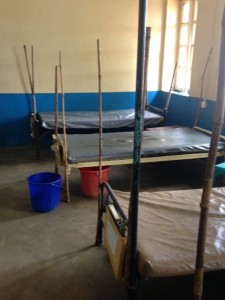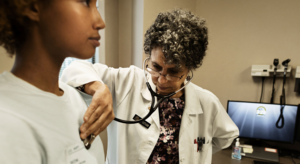Obstetrician Dr. Melissa Wolf shares the second part of her great adventure. If you haven’t read Part I, you can find it by clicking here.
“After a bit of soul searching about my medical career path, I recently decided to try my hand in international health care. I researched multiple potential options and ultimately found myself in a maternity hospital in South Sudan with Doctors Without Borders (MSF) for seven weeks. Having spent the prior months and years mired in the frustrations of insurance claims, documentation requirements, (un)meaningful use criteria, and curious nursing protocols, I viewed my time with MSF as an opportunity to practice genuine clinical medicine in a new environment. The challenge was great and I was not disappointed.
The adventures began with the simple logistics of living in a third world country. It took four days of travel to actually arrive at my field site and about a week thereafter to adjust to the ten hour time change. The weather was unfathomably hot with temperatures reaching 120 degrees some days and it took over two weeks for me to acclimate. Initially I could barely walk even short distances without having to rest and, on rounds in the hospital I could not stand at the bedside but was forced to sit down or else collapse from the heat. Not a day went by in the entire seven weeks that my clothes and hair were not completely drenched in sweat. In fact wearing dry clothing was one of the most notable luxuries of returning home.
Our conditions were very basic yet livable. There were cold water showers which felt amazing on 120 degree days, pit toilets, and a generator that supplied electricity. I had my own room with a concrete floor, bed, mosquito net, and closet. Food was provided although the options were limited and I found myself eating mostly the same thing repeatedly. We typically had rice, pasta, fruit, lentils, and sometimes chicken or goat meat. I don’t want to imagine exactly how they obtained the goat meat but several times I saw chickens strutting around in the compound that later had clearly become dinner. Breakfast was often coffee, bread, and sometimes scrambled eggs if eggs were available in the local market. There was also an eggplant peanut sauce dish that was not my personal favorite but seemed popular with the other expats.
On any given day I found frogs in my room, lizards under my bed, giant beetles in the sink, and huge numbers of bats flying overhead. One day a bird dropped the large rodent it was carrying out of the sky within a few feet of where I was standing and then scooped it back up again and flew off. The next day the same thing happened with a chicken head. At times the hospital was flooded with ankle deep water, the power was out, and supplies were limited. Even so, I was amazed at how well we managed to keep morale up amongst ourselves and how well we managed to care for large numbers of gravely ill patients.
I lived with a team of 25 people in a residential “compound” and many of the expatriates there were on six to nine month assignments. My specialty being surgical was a shorter length of time. The other expats were from all over the world including Africa, Canada, Australia, Europe, the Middle East, and the United States. Ages ranged from 28 to 65 years and getting to know such a variety of people in the context of life together in a third world country made for an interesting yet complex dynamic especially since we were all living and working closely together the entire time. Imagine going home after a full day of work to spend the evening with your office staff, eat breakfast with them the next morning, and then work with them again day after day for 7 weeks.
The medical facility was very basic yet despite its simplicity we managed to care for some of the most compromised obstetric patients I have ever encountered. There were interpreters to help communicate and the hospital was primarily staffed with local people. The local midwives handled all the “uncomplicated” deliveries including singletons, twins, breech, preterm births, intrauterine demise, VBAC patients, eclamptics, and post partum hemorrhage. I was called to evaluate the “complicated” patients including those with placenta previa, abruption, DIC, hemorrhage requiring hysterectomy, unconscious patients, vaginal triplets, ruptured uterus, and obstructed labor cases requiring cesarean. I was also in charge of managing a large ward of antepartum patients admitted with conditions such as malaria, bloody diarrhea, anemia (as in hemoglobin of 3g/dl), breast abscess, sepsis, snake bites, and the like.
I had rarely, if ever, seen or managed any of the diseases or conditions I encountered prior to my time in South Sudan. There was a basic ultrasound machine, the ability to check finger stick hemoglobin, and the ability to test for malaria. We had a rudimentary operating room (called the “operating theater”), the ability to do spinal anesthesia, and a handful of medications to work with. There was absolutely no patient confidentiality or privacy whatsoever with patients and families often crowded together at each other’s bedsides listening in on daily rounds. Charting was done on a piece of paper at the bedside. Blood pressure, temperature, and pulse were also recorded at the bedside. Diagnosis was made by clinical history through an interpreter and physical exam. Treatment was often initiated with very little information and very few options. Surprisingly patients did amazingly well and many who arrived barely conscious having literally walked in from their village after laboring at home for several days walked out a few days later in good condition. Hygiene and cleanliness were nonexistent; however, surgical wounds did not get readily infected.
Overall the medical experience was unforgettable. I treated extremely ill patients who I couldn’t communicate with, who had conditions I had never seen, in a filthy environment, with unfamiliar instruments and very few resources, and yet they managed to survive. Having no ability to communicate directly with patients except through the interpreter I could not rely on the so-called doctor-patient relationship or establish any sense of rapport. However, for the first time in many years I felt like an actual physician, not just a cog in the wheel of compliance mandates and documentation requirements.
It was difficult, confusing, and overwhelming, but also genuinely fun to think critically and see people recover well. Additionally, it was rewarding to attune to body language, facial expressions, and intuition to read how patients were feeling and what they were experiencing. On one occasion following a c/section for a life threatening bleeding previa I sat with my patient in the recovery area as she stared at me directly for at least 10 minutes. Her child had not survived, but despite three days of bleeding at home before arriving barely conscious at the hospital, she had. We sat together awaiting the completion of her blood transfusion just looking silently at each other. I can’t know what she was thinking but I was internally thanking her for surviving such horrible odds and feeling utterly amazed at her resilience and I felt she understood me well. Ultimately, I returned home feeling my medical training had actual merit and with an enthusiasm for medicine that I had long forgotten.
In general I chose to travel with MSF because their organizational values matched my personal values and this aspect was extremely important to me. The upside was that once accepted into the program I felt well guided and supported throughout my experience. The downside was that it took about six months from my initial application to acceptance, and the assignments required flexibility. Once accepted, I did not know where or when I was going or for what length of time. I had to commit to an unknown assignment at an unknown time for an unknown number of weeks. That degree of uncertainty was a bit unnerving but also added to the excitement of the adventure.
For anyone considering a stint in international medicine I would advise a strong sense of adventure, a lack of squeamishness, a courageous heart, and above all else flexibility. Certainly pairing up with a like-minded organization you trust is also of utmost importance. Both the living and working conditions are very challenging and none of the experience was anything like what I anticipated. Daily life was more difficult, medical care was more interesting, and in seven weeks I learned more about my personal limitations, intuition, and abilities than I ever could have imagined. I will not soon forget the lessons learned on this adventure, and despite its intensity, I do plan to take on another assignment with MSF in the future.”
Latest Posts
Find what you're looking for:
Popular Categories:
Career Change | Career Enhancement | Job Search | Personal Development
1 Comments
Leave a Comment
























Thank you for sharing this post.